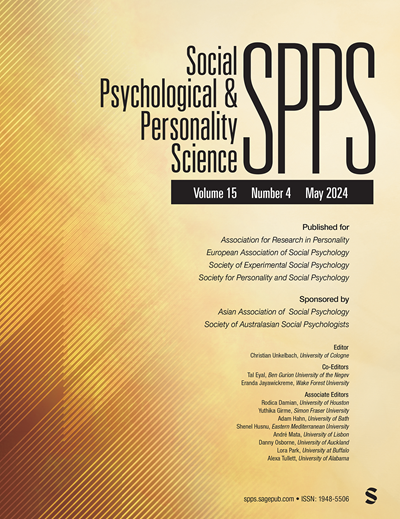当人们认为自己与对话伙伴有亲缘关系时,引导式对话对智力谦逊性的提升更大
IF 3.3
2区 心理学
Q1 PSYCHOLOGY, SOCIAL
引用次数: 0
摘要
智力上的谦逊包括认识到自己的知识有局限性,认识到自己的信念可能是不正确的。尽管文献记载了智力谦逊的益处,但很少有研究探讨与智力谦逊长期变化相关的因素。本研究调查了以引导性对话为重点的干预措施是否与知识谦逊度的提高有关,以及当人们认为与其对话伙伴的从属关系更强时,这些变化是否更强烈。参与者(937 人)完成了一项包含四次引导式对话的干预,并在每次对话后报告了他们与对话伙伴的关系。在第一次对话前、最后一次对话后和最后一次对话后一个月,分别对智力谦逊度进行了测量。正如假设的那样,智力谦逊度随着时间的推移而增加,尤其是当人们认为与对话伙伴的关系更亲密时。这些研究结果表明,当人们认为自己与谈话对象有更强的从属关系时,包含社交成分的智力谦逊干预措施可能会产生更强的效果。本文章由计算机程序翻译,如有差异,请以英文原文为准。
Increases in Intellectual Humility From Guided Conversations Are Greater When People Perceive Affiliation With Conversation Partners
Intellectual humility involves awareness that one’s knowledge has limitations and that one’s beliefs might be incorrect. Despite documented benefits of intellectual humility, few studies have examined factors associated with long-term changes in intellectual humility. This study investigated whether an intervention focused on guided conversations was associated with increases in intellectual humility and whether these changes were stronger when people perceived greater affiliation with their conversation partner. Participants ( N = 937) completed an intervention with four guided conversations and reported on their relationship with their partner after each conversation. Intellectual humility was measured before the first conversation, immediately after the last conversation, and 1 month following the last conversation. As hypothesized, intellectual humility increased over time, especially when people perceived greater affiliation with their conversation partner. These findings suggest that intellectual humility interventions with social components may have stronger effects when people perceive greater affiliation with their partners.
求助全文
通过发布文献求助,成功后即可免费获取论文全文。
去求助
来源期刊

Social Psychological and Personality Science
PSYCHOLOGY, SOCIAL-
CiteScore
12.50
自引率
1.80%
发文量
77
期刊介绍:
Social Psychological and Personality Science (SPPS) is a distinctive journal in the fields of social and personality psychology that focuses on publishing brief empirical study reports, typically limited to 5000 words. The journal's mission is to disseminate research that significantly contributes to the advancement of social psychological and personality science. It welcomes submissions that introduce new theories, present empirical data, propose innovative methods, or offer a combination of these elements. SPPS also places a high value on replication studies, giving them serious consideration regardless of whether they confirm or challenge the original findings, with a particular emphasis on replications of studies initially published in SPPS. The journal is committed to a rapid review and publication process, ensuring that research can swiftly enter the scientific discourse and become an integral part of ongoing academic conversations.
 求助内容:
求助内容: 应助结果提醒方式:
应助结果提醒方式:


